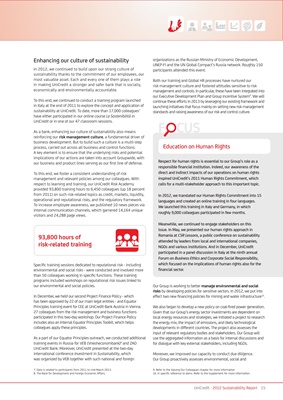
Enhancing our culture of sustainability organizations as the Russian Ministry of Economic Development,
UNEP-FI and the UN Global Compact’s Russia network. Roughly 150
In 2012, we continued to build upon our strong culture of participants attended this event.
sustainability thanks to the commitment of our employees, our
most valuable asset. Each and every one of them plays a role Both our training and Global HR processes have nurtured our
in making UniCredit a stronger and safer bank that is socially, risk management culture and fostered attitudes sensitive to risk
economically and environmentally accountable. management and controls. In particular, these have been integrated into
our Executive Development Plan and Group Incentive System9. We will
To this end, we continued to conduct a training program launched continue these efforts in 2013 by leveraging our existing framework and
in Italy at the end of 2011 to explore the concept and application of launching initiatives that focus mainly on setting new risk management
sustainability at UniCredit. To date, more than 17,000 colleagues7 standards and raising awareness of our risk and control culture.
have either participated in our online course La Sostenibilità in
F CUS
UniCredit or in one of our 47 classroom sessions.
As a bank, enhancing our culture of sustainability also means
reinforcing our risk management culture, a fundamental driver of
business development. But to build such a culture is a multi-step
process, carried out across all business and control functions. Education on Human Rights
A key element is to ensure that the underlying risks and potential
implications of our actions are taken into account Groupwide, with
our business and product lines serving as our first line of defense. Respect for human rights is essential to our Group’s role as a
responsible financial institution. Indeed, our awareness of the
To this end, we foster a consistent understanding of risk direct and indirect impacts of our operations on human rights
management and relevant policies among our colleagues. With inspired UniCredit’s 2011 Human Rights Commitment, which
respect to learning and training, our UniCredit Risk Academy calls for a multi-stakeholder approach to this important topic.
provided 93,800 training hours to 6,450 colleagues (up 18 percent
from 2011) on such risk-related topics as credit, markets, liquidity, In 2012, we translated our Human Rights Commitment into 15
operational and reputational risks, and the regulatory framework. languages and created an online training in four languages.
To increase employee awareness, we published 10 news pieces via We launched this training in Italy and Germany, in which
internal communication channels, which garnered 14,164 unique
roughly 9,000 colleagues participated in few months.
visitors and 24,288 page views.
Meanwhile, we continued to engage stakeholders on this
issue. In May, we presented our human rights approach in
93,800 hours of Romania at CSR Lessons, a public conference on sustainability
attended by leaders from local and international companies,
risk-related training NGOs and various institutions. And in December, UniCredit
participated in a panel discussion in Italy at the ninth annual
Forum on Business Ethics and Corporate Social Responsibility,
Specific training sessions dedicated to reputational risk - including which focused on the implications of human rights also for the
environmental and social risks - were conducted and involved more financial sector.
than 50 colleagues working in specific functions. These training
programs included workshops on reputational risk issues linked to
our environmental and social policies. Our Group is working to better manage environmental and social
risks by developing policies for sensitive sectors. In 2012, we put into
In December, we held our second Project Finance Policy - which effect two new financing policies for mining and water infrastructure10.
has been approved by 22 of our main legal entities - and Equator
Principles training event for CEE at UniCredit Bank Austria in Vienna. We also began to develop a new policy on coal-fired power generation.
27 colleagues from the risk management and business functions Given that our Group’s energy sector investments are dependent on
participated in this two-day workshop. Our Project Finance Policy local energy resources and strategies, we initiated a project to research
includes also an Internal Equator Principles Toolkit, which helps the energy mix, the impact of emissions, and likely technological
colleagues apply these principles. developments in different countries. The project also assesses the
input of relevant regulatory bodies and stakeholders. Our Group will
As a part of our Equator Principles outreach, we conducted additional use the aggregated information as a basis for internal discussions and
training events in Russia for VEB (Vnesheconombank)8 and ZAO for dialogue with key external stakeholders, including NGOs.
UniCredit Bank. Moreover, UniCredit presented at the two-day
international conference Investment in Sustainability, which Moreover, we improved our capacity to conduct due diligence.
was organized by VEB together with such national and foreign Our Group proactively assesses environmental, social and
7. Data is related to participants from 2011 to mid-March 2013. 9. Refer to the Valuing Our Colleagues chapter for more information
8. The Bank for Development and Foreign Economic Affairs. 10. In specific reference to dams. Refer to the Supplement for more information.
UniCredit · 2012 Sustainability Report 15